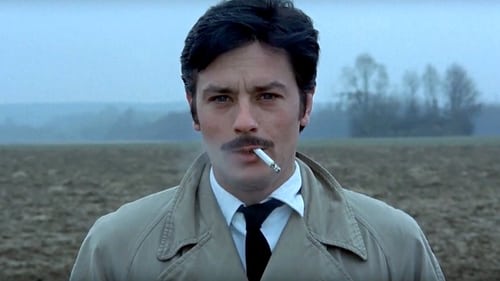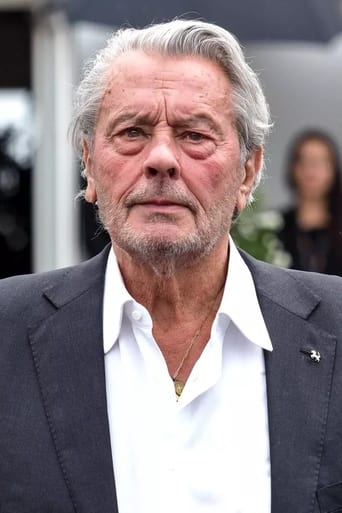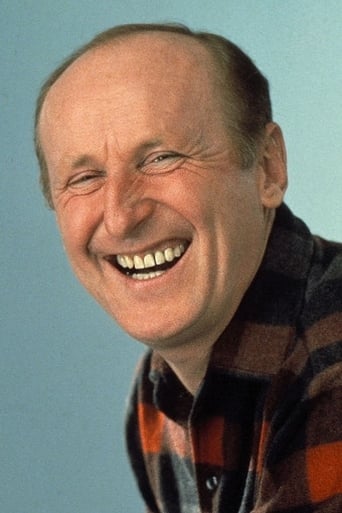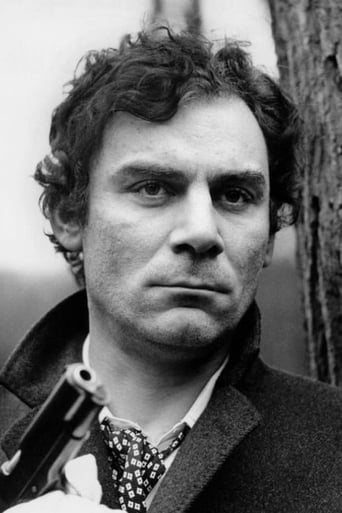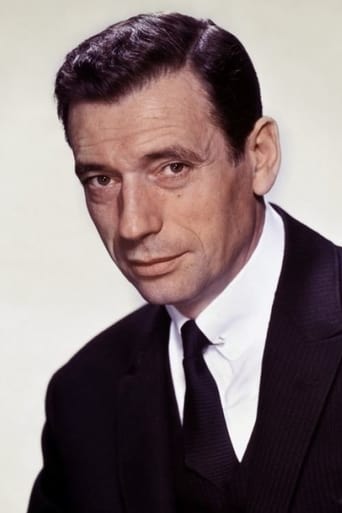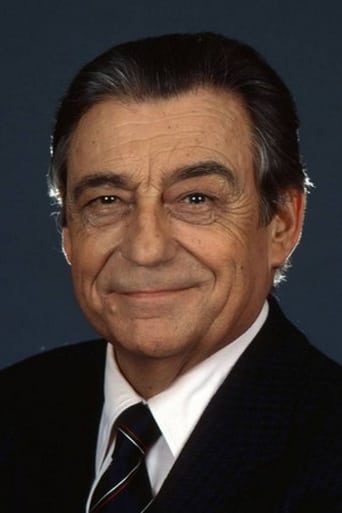adrian-43767
LE CERCLE ROUGE is a masterpiece, even if the ending is a bit too pat for my liking. First, we see Delon - in one of his finest roles ever - released from jail and he is quick to surmise that his wife has been cheating on him, and he knows with whom, too. Gian Maria Volonte manages to elude police inspector André Bourvil - a memorable against type performance from a comedian riddled with cancer and in his final role here -- and joins up with Delon in unusual but totally believable circumstances, allowing the two men to bond; and Yves Montand, a drunkard who was once a top police officer and crack shot, now suffering evils similar to those of Ray Milland in THE LOST WEEKEND (US 1945).Jean-Pierre Melville confessed in his autobriography that he had wanted to team up Delon and Belmondo in LE CERCLE ROUGE, but Belmondo felt that his role would be far less substantial than Delon's and decided not to appear in the movie. Looking at Volonte's part, which Melville initially intended for Belmondo, I think the latter was right but Melville also said that he planned to make it meatier if Belmondo came on board.In the end, the acting is exceptional all round, so Belmondo is not missed. Each of the three main characters is flawed in some way, both in terms of behaviour and of some mental ineptitude, and that is a theme in the movie, how everyone is limited by an invisible circle of personal limitations.As a police interrogator (brilliantly played by Périer) points out, everyone is a sinner, even a youngster he booked on charges of drug consumption, to put pressure on his father, only to find out that the kid actually took drugs.The action sequences are first class (the heist is brilliant), the dialogue sharp and realistic, and photography remarkable in its simplicity and effectiveness.Ultimately, I expected a little bit more of a fight at the end, but it is a crisp and swift ending which shows the character played by Bourvil as he is: a man doing his job above all other considerations.LE CERCLE ROUGE also left me with the impression that the criminals are on both sides of the circle, but the ones on the side of the law have more power in their hands. I've seen this thought-provoking film some five times in the last 25 years, and will probably go back to it soon. Strongly recommended!
Barbouzes
Melville is overrated. The story in Le Circle Rouge is actually well put together (and features a fine brochette of well-known actors of the era) but it still feels like the work of a one-track-mind guy who believes guys are guys, and only guys know about life - how hard and how full it is. (The women in Melville's scripts never amount to much. In this movie, they are either mute cabaret dancers, child-like bunny waitresses who stand as background with nothing to do, and 1 lying cheating two timing Lilith- and of course that one is completely naked the only time we see her, and for no real good reason. Need I say: not one of these women gets more than 1 speaking line, when they do get to speak. Melville, your auteur vision is called Misogyny.) The heist is suspenseful, some plot twists are well introduced, 2 or 3 scenes stand out, but all in all, it feels too long, and very artificial (Yo, Melville, dude, what 's up with the 60s American cars featured in ALL your films? Hello, how many of these cars really ran around Paris in 1970?! And how discreet they must have been as gangsters getaway cars....!) It is preciously noir and dead serious, but in the end it is shallow. I'd give 4 Melvilles for 1 B-movie with Bogart and true heft in it.
ElMaruecan82
What a waste! As I was watching Melville's "Red Circle", I couldn't help but think of life's cruelty. One of the greatest comedic French actors had just started to show how naturally equipped he was for drama, his name was Bourvil but he made a first name out of his breakthrough performance, André, as to distance himself from the lovable buffoon teaming up with De Funès. And yes, André Bourvil as Detective Mattei was mesmerizing without trying, his range of emotions is mostly composed of reactions and the conviction that no matter how hopeless the case is, he must move forward.And it's a waste that such a great actor had to leave the world just when we had a glimpse of his real talent, when he could have ruled French cinema for one decade or two. No, "The Red Circle" was his swan song, a final farewell to the screen he graced for thirty years. Cancer was already devouring him while he was making the film, but just as if he were impregnated by the toughness and stubbornness of his character, he kept going. And maybe that's what manhood is about, moving forward and acting according to his nature. And I think if there ever is a lesson Melville movies could teach us, is this idea of virility not as a synonym of toughness, strength, or a way with women (women have actually very secondary importance in his film) but tenacity, loyalty and principles.All the men that populate Melville's "Red Circle" are driven by a code, not exactly a code of honor, but close enough. Melville would have never dared to entrust his stories to lowlife criminals, he despised criminals with all his heart but acknowledged that gangsters were the best vehicle to values such as loyalty, duty, friendship, that Cinema made appealing. Two years later, a certain movie made by Francis Ford Coppola would prove him right, and Coppola would also suffer from the claim that he romanticized gangsters. Melville's gangsters are men who have been put in the wrong path and following their existential road, can't turn the clock back and have no other choice than trying to put within their dishonest racket, some bits of honor. You know you're not in the right side of the law, but you never try to betray your own codes, fair trade.And this is why the gangsters only kill when they're threatened, why they let the security guard alive during the heist, causing him to set the alarm, this is why the day before, when Vogel (Gian Maria Volonte) who just slipped away from Mattei, hides in the car driven by freshly released Corey (Alain Delon), he doesn't know that Corey saw him and let him do so. When the two men confront each other, a few lines are said and they're barely audible, the essential is in the eyes, the men know they can trust each other, and later, it pays off, when Vogel saves Corey from a tricky situation. What goes between these two recluse, taciturn men is the telepathic understanding that some things are better left unspoken, except the essential: the heist, in men's words: business, action.Melville made "Bob le Flambeur", one of the seminal caper films, but never has a heist looked so fluidly easy and fascinating to watch. There's not one single shot wasted, from the preparation to the execution, everything is perfectly oiled, and I loved the interpretation of Montand as Jansen, a former cop and sharpshooter, they needed one to deactivate the alarm from a thirty meters distance. And Melville is like the God-like manipulator of these figures; his voice sets the tone with a quotation of Buddha about a red circle, a sort of symbolic place where men with a 'history' together end up confronting each other. The line was made up, as it's always the case with Melville, but it serves a purpose, to leave us disillusioned about the heist, this is not what the film is about.We know it's doomed, and it's a masterstroke not to have added some artificial romance as the obligatory 'human factor'… what leads the men to their downfall is just a chain of events implicating Mattei, Corey's former partner (and obvious traitor) and Jean-Pierre Périer as a man with his feet on the two sides. The mechanisms are all set-up from the start and at the end, we're just accepting the facts with resignation, Corey and Vogel had it coming but somewhat, we don't think they deserved it, and the last line coming from Jansen about the Police is ambiguous but gives a hint about his 'personal' motives. Sometimes, it's not just business. All men have history and it's the record they try to settle that drive their actions. Again, that was two years before Coppola.One of the most memorable lines of the film (given the film's overall quietness, any powerful line was a high spot) was: "every man is guilty, we're born innocent but it never lasts", says the Chief of Police to Mattei in the beginning and the end, Mattei walks away repeating "all guilty", everyone is part of the same game, it's all about deception and betrayal, crooks playing fair, cops cheating, and that's the only way to make these two worlds meet, and this is why there's always one raison to root for all the characters, not enough to make the endings sad, only realistic albeit cynical. That's what this smiling Buddha in the opening title seems to express: cynicism, disillusion, whatever you build will be wasted.And what a waste that these men lost after all these efforts but more importantly that André Bourvil died so shortly after the film, and that a director of Melville's caliber would die 3 years later after his second feature film with Delon "Un Flic". When real life is cruel, you'll find more relief in Melville's films.

